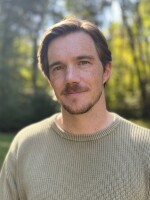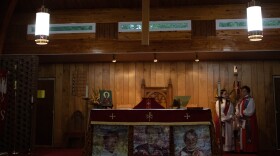North Carolina Public Radio presents Pauli, a podcast about the power of one person to change what's possible for us all. Available on Apple Podcasts, Spotify, Stitcher and NPR One.
Inspired by the life, work and lasting influence of Durham-based civil rights activist Pauli Murray, this series explores the bravery and brilliance of a tireless hero for social justice. WUNC's Leoneda Inge takes listeners through three chapters of Pauli's journey as a battle-ready solider against racism and sexism and a spiritual mentor for today's justice advocates.

Use the links below to listen to and download all episodes.
EPISODE ONE: Pauli Murray vs. Jane Crow
As a Black, queer, Southern woman, Pauli Murray endured a sinister combination of sexism and racism. She called this specific kind of discrimination Jane Crow, and no matter where Pauli went, Jane Crow followed. But Pauli refused to let that dictate her life. With the pen as her sword, Pauli fought to undermine Jane Crow's grip on the lives of Black women, wielding the written word as a weapon for truthtelling. As a legal scholar, she inspired the likes of Ruth Bader Ginsburg and helped secure equal rights for women. As a poet, Murray has given hope and resilience to countless women of color ― offering messages of brave love and bold defiance that resonate today.

EPISODE TWO: Laying Down The Law
In 1948, Pauli Murray began a years-long journey, crossing the country to document each state's segregation laws. The result was an exhaustive, 700-page tome. The text, published in 1951, may have a pretty unexciting title — "States' Laws on Race and Color" — but its nickname is more glamorous: the "bible of civil rights law." Pauli's work documenting discriminatory ordinances across the country was pivotal to the NAACP's legal team as they fought key battles against segregation in the mid 20th century. But Murray's road to writing the bible was anything but easy, and she was often on the verge of having to forego the seminal project.
[Click to listen]

EPISODE THREE: Saint Pauli
After spending decades fighting for gender equality and racial justice, Pauli Murray decided to unite her convictions for human rights with her religious spirituality. In her early 60s, Pauli entered seminary and became the first Black woman ordained as an Episcopal priest in 1977. She brought to the priesthood the same power she'd carried as a firebrand all her life ― a power that is strengthened by women in the church today standing tall on Pauli's shoulders.
Learn more about the effort to rename a building on the campus of the University of North Carolina at Chapel Hill for Pauli Murray on this episode of WUNC's podcast Tested.

Podcast Production Team
Leoneda Inge - Host/Producer
Charlie Shelton-Ormond - Managing Producer
Stacia Brown - Producer
Jenni Lawson - Sound Engineer
Lindsay Foster Thomas - Editor
Special Thanks To:
The Southern Oral History Program at the University of North Carolina at Chapel Hill
Natalie Dudas-Thomas
Elizabeth Baier
The City of Durham, North Carolina










